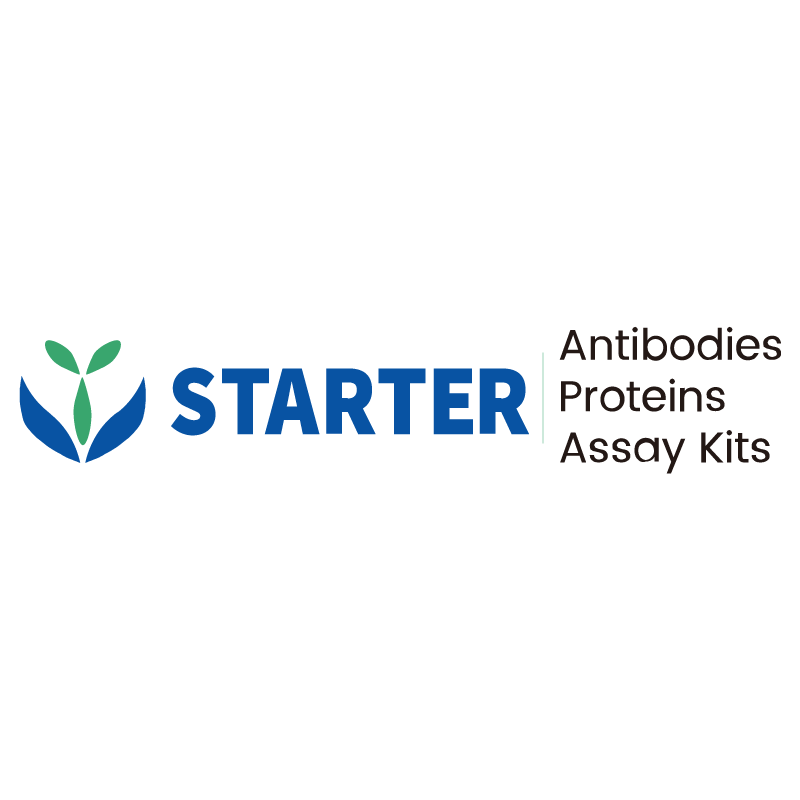WB result of LRRC15 Recombinant Rabbit mAb
Primary antibody: LRRC15 Recombinant Rabbit mAb at 1/1000 dilution
Lane 1: Daudi whole cell lysate 20 µg
Lane 2: U-87 MG whole cell lysate 20 µg
Lane 3: Saos-2 whole cell lysate 20 µg
Negative control: Daudi whole cell lysate
Secondary antibody: Goat Anti-rabbit IgG, (H+L), HRP conjugated at 1/10000 dilution
Predicted MW: 64 kDa
Observed MW: 60-90 kDa
Product Details
Product Details
Product Specification
| Host | Rabbit |
| Antigen | LRRC15 |
| Synonyms | Leucine-rich repeat-containing protein 15; Leucine-rich repeat protein induced by beta-amyloid homolog (hLib); LIB |
| Immunogen | Recombinant Protein |
| Location | Cell membrane |
| Accession | Q8TF66-1 |
| Clone Number | S-2473-43 |
| Antibody Type | Recombinant mAb |
| Isotype | IgG |
| Application | WB, IHC-P, ICC |
| Reactivity | Hu |
| Positive Sample | U-87 MG, Saos-2 |
| Purification | Protein A |
| Concentration | 0.5 mg/ml |
| Conjugation | Unconjugated |
| Physical Appearance | Liquid |
| Storage Buffer | PBS, 40% Glycerol, 0.05% BSA, 0.03% Proclin 300 |
| Stability & Storage | 12 months from date of receipt / reconstitution, -20 °C as supplied |
Dilution
| application | dilution | species |
| WB | 1:1000 | Hu |
| IHC-P | 1:2000 | Hu |
| ICC | 1:500 | Hu |
Background
LRRC15 (leucine-rich repeat-containing protein 15) is a 581-amino-acid type I transmembrane receptor encoded on chromosome 3q29, featuring 15 extracellular leucine-rich repeats that fold into a horseshoe-shaped ligand-binding domain connected to a single-pass membrane helix and a short 22-residue cytoplasmic tail, and it is physiologically expressed at low levels in placenta, skin, tonsil and gastric mucosa but becomes strongly up-regulated by TGF-β and IL-1β in cancer-associated fibroblasts, wound-healing myofibroblasts and virally inflamed lungs, where it engages extracellular matrix proteins such as fibronectin, collagen and laminin to modulate cell adhesion, migration and stemness, acts as a decoy receptor that sequesters SARS-CoV-2 spike protein without mediating viral entry thereby exerting antiviral and antifibrotic effects, and promotes tumor progression and metastasis through integrin-β1/FAK/PI3K signaling, making LRRC15 a promising stromal and mesenchymal biomarker and a therapeutic target for antibody–drug conjugates and small-molecule inhibitors in cancer, fibrosis and infectious diseases .
Picture
Picture
Western Blot
Immunohistochemistry
IHC shows positive staining in paraffin-embedded human tonsil. Anti-LRRC15 antibody was used at 1/2000 dilution, followed by a HRP Polymer for Mouse & Rabbit IgG (ready to use). Counterstained with hematoxylin. Heat mediated antigen retrieval with Tris/EDTA buffer pH9.0 was performed before commencing with IHC staining protocol.
IHC shows positive staining in paraffin-embedded human breast cancer. Anti-LRRC15 antibody was used at 1/2000 dilution, followed by a HRP Polymer for Mouse & Rabbit IgG (ready to use). Counterstained with hematoxylin. Heat mediated antigen retrieval with Tris/EDTA buffer pH9.0 was performed before commencing with IHC staining protocol.
IHC shows positive staining in paraffin-embedded human colon cancer. Anti-LRRC15 antibody was used at 1/2000 dilution, followed by a HRP Polymer for Mouse & Rabbit IgG (ready to use). Counterstained with hematoxylin. Heat mediated antigen retrieval with Tris/EDTA buffer pH9.0 was performed before commencing with IHC staining protocol.
IHC shows positive staining in paraffin-embedded human lung adenocarcinoma. Anti-LRRC15 antibody was used at 1/2000 dilution, followed by a HRP Polymer for Mouse & Rabbit IgG (ready to use). Counterstained with hematoxylin. Heat mediated antigen retrieval with Tris/EDTA buffer pH9.0 was performed before commencing with IHC staining protocol.
IHC shows positive staining in paraffin-embedded human lung squamous cell carcinoma. Anti-LRRC15 antibody was used at 1/2000 dilution, followed by a HRP Polymer for Mouse & Rabbit IgG (ready to use). Counterstained with hematoxylin. Heat mediated antigen retrieval with Tris/EDTA buffer pH9.0 was performed before commencing with IHC staining protocol.
IHC shows positive staining in paraffin-embedded human thyroid cancer. Anti-LRRC15 antibody was used at 1/2000 dilution, followed by a HRP Polymer for Mouse & Rabbit IgG (ready to use). Counterstained with hematoxylin. Heat mediated antigen retrieval with Tris/EDTA buffer pH9.0 was performed before commencing with IHC staining protocol.
IHC shows positive staining in paraffin-embedded human osteosarcoma. Anti-LRRC15 antibody was used at 1/2000 dilution, followed by a HRP Polymer for Mouse & Rabbit IgG (ready to use). Counterstained with hematoxylin. Heat mediated antigen retrieval with Tris/EDTA buffer pH9.0 was performed before commencing with IHC staining protocol.
IHC shows positive staining in paraffin-embedded human synovial sarcoma. Anti-LRRC15 antibody was used at 1/2000 dilution, followed by a HRP Polymer for Mouse & Rabbit IgG (ready to use). Counterstained with hematoxylin. Heat mediated antigen retrieval with Tris/EDTA buffer pH9.0 was performed before commencing with IHC staining protocol.
Immunocytochemistry
ICC shows positive staining in U87-MG cells (top panel) and negative staining in Daudi cells (below panel). Anti-LRRC15 antibody was used at 1/500 dilution (Green) and incubated overnight at 4°C. Goat polyclonal Antibody to Rabbit IgG - H&L (Alexa Fluor® 488) was used as secondary antibody at 1/1000 dilution. The cells were fixed with 100% ice-cold methanol and permeabilized with 0.1% PBS-Triton X-100. Nuclei were counterstained with DAPI (Blue). Counterstain with tubulin (Red).


